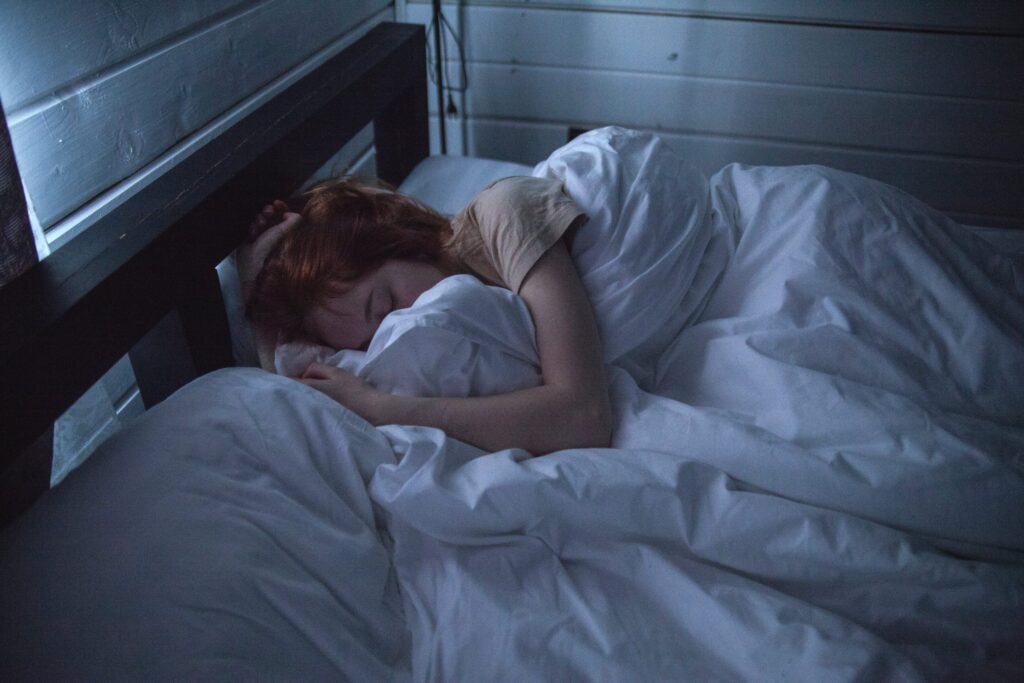You sleep worse when you're stressed, and poor sleep itself can increase sensitivity to stress. When you experience stress, your cortisol levels rise, making it difficult for the body to relax and fall asleep. It wants to be prepared for the perceived danger around you. In other words, stress and sleep are closely linked.
How stress influences your sleep
During the night, the body cleanses and prepares itself for the next day. When you experience a lot of stress, the body has more to deal with, such as cortisol and adrenaline. Additionally, it's common to sleep fewer hours when stressed because it's challenging to relax.
This can result in the organs occasionally struggling to keep up with all the cleaning and preparations, requiring a higher energy level to cope with the task.The increase in energy might cause you to wake up. While it may appear more sensible to continue sleeping, it's the body's clever method of communicating with you. Your body wants to guide you towards well-being by revealing its needs; all you need to do is tune in and listen.

Natural detoxification during the night
When you're under a lot of stress, it's common for the liver to bear an additional burden due to the surges of cortisol, adrenaline, and dopamine that stress generates. This natural detoxification process restores the body and provides you with more energy to handle the next day. The liver has its scheduled cleaning time from 1 to 3 AM. If you frequently wake up during this period, it could be because the liver needs extra energy to clean up after the day. In such cases, it's advisable to assess your stress levels.
There are many tips on how to improve your sleep, but here are some that I personally find particularly helpful.
5 Tips for better sleep during stress:
1. Establish a calm routine
It might be tempting to scroll on your phone, sit in front of the TV, or play on the computer to unwind. While it gives your body rest, it bombards your brain with a lot of stimuli, and the light from the screens inhibits melatonin, making you feel less sleepy.
Instead, try reading a book, listening to music, spending time in nature, or engaging in a calm hobby to unwind. Dim the lights as much as possible and create a cozy environment. When you feel ready, go to bed.
2. Conclude the day
Conclude with deep breathing and calm thoughts. Start by taking a few gentle breaths through the nose, reaching down to expand the belly outward.
If you place a hand on your stomach, you should see it move as you breathe. When finished, think of five things you are grateful for, big or small. Feel the sense of well-being growing in your chest and filling your entire body.
3. Consider what you eat
By consuming nutritious food, you calm the body because it senses it's receiving the necessary nutrients.
As mentioned earlier, the body cleanses during the night. At that time, it doesn't want a lot of food in the stomach to deal with. Therefore, ensure that you have your last meal 2-3 hours before bedtime. It reduces the body's perceived stress.
4. Get moving
Exercise is known to help you relax and feel good, as it releases endorphins. However, tailor the intensity of your workout to your stress level.
Exercise wisely. In many cases, a mix of gentle and intense physical activity is beneficial, but if you're experiencing high stress, vigorous exercise might exacerbate it. In such situations, opt for gentler movements. The key is the activity itself.
5. Boost serotonin
Serotonin is the "feel-good" hormone that conveniently transforms into melatonin, the "sleep" hormone. So, feeling good during the day actually aids your sleep in the evenings — clever, isn´t it?!
Boost serotonin through hugs, facing the sky, massage, touch, and foods like avocado, banana, buckwheat, quinoa, oats, chicken, game meat, and pumpkin seeds.
Both stress and sleep are individual experiences, so remember to tune in and adjust the tips based on what feels right for you. Tune into what you need.
At Stockholm University, they conduct research on sleep and stress, exploring how factors like recovery and stress impact sleep. Due to the increasing prevalence of stress and sleep issues in recent years, they have developed "lilla sömnskolan" for more information and tips.
In summary
Stress and sleep are closely linked and influence each other in both directions. Stress disrupts sleep, and poor sleep makes you more susceptible to stress. But take it easy; there are several things you can do to improve your sleep when experiencing stress. Establish a calm routine, have a peaceful conclusion to your day, consider your diet, engage in physical activity, and boost serotonin. Your body wants the best for you, so take the time to listen, and you may discover more personal strategies.
January 2024
